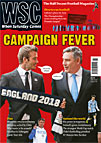 Maidstone United hoped that the sale of a talented young player would allow them to return home. As John Bunyard explains, this hasn't happened
Maidstone United hoped that the sale of a talented young player would allow them to return home. As John Bunyard explains, this hasn't happened
I first saw it one Saturday as I walked down the side of the Sittingbourne pitch. It was best described as a half-Fellaini: an attempt at an afro curtailed by an over-zealous barber. It sat atop the head of the kid deputising for our regular centre-back, absent for the unlikely reason of being under arrest on a charge of attempted murder. Though a tall lad, he looked too young to buy a drink.
I asked who he was. Obviously it was Chris Smalling, said our resident know-all. Didn’t I know he’d been with us since he was 16? Maybe I’d forgotten but I wouldn’t again. When you play in the Ryman League, it’s nothing unusual to have youngsters coming into the first team, it happens most times a senior player is injured. Normally they’re like fish out of water, you’re relieved when they don’t embarrass themselves and, if they do, you don’t expect to see them again. But this one was different.
It wasn’t his size and strength that struck me, nor his pace – though he had all those. It was his composure. At 18, he was playing alongside someone more than ten years his senior, but you couldn’t tell from a distance which was the old stager. When the ball was played through, he’d get onto it, shrug off the nippy striker, turn, and play it away. No panicking, no hoofing. You could see straight away why he was an England schoolboy.
Now, having a prodigy on our hands wasn’t as extraordinary as you might think. We already had another two England schoolboys in the reserves and a fourth was to follow. Our club, Maidstone United, may have had trouble making ends meet since its Fourth Division forerunner went bust while Smalling was still in nappies, but the youth development setup punches way above its weight. Ironically, this very strength was ultimately to work against us.
Such were the demands made by the FA on the precocious Smalling that he ended up playing only a dozen first-team games for us that season. We missed him too. When he did turn out he was regularly Man of the Match. I was standing all of ten yards away as he headed his only senior goal in a crucial match at East Thurrock. The trouble was that he was equally good for England and we got second pick. But then, we knew this was no ordinary talent.
The national press agreed and it was no surprise when we heard Middlesbrough were looking at him. Fantastic, I thought. He must be worth a fair bit and the money would go nicely towards building the stadium back in Maidstone we’ve been after all these years. But no, apparently Smalling hadn’t signed a contract because it would have precluded him from playing at schoolboy level. We stood to get nothing. When Roy Hodgson nipped in, that’s what we got.
Well, almost. We learned a while later that Fulham had paid us an ex gratia sum, rumoured to be £10,000, and it was said we’d get the same again if he were sold on. Everyone shrugged, took it with good humour and wished the kid well. And so it remained, with Smalling progressing in no time to the England Under-21s, starting in Fulham’s European matches and catching the nation’s eye against Chelsea where, sans afro, he excelled despite an unfortunate own goal.
Then it turned sour – not for Smalling, but Stones fans. First Arsène Wenger made a big bid and then Alex Ferguson – perhaps determined to avenge the funny business over Aaron Ramsey – topped it with one reckoned at £10-12 million. In effect, Mohamed Fayed had turned a profit equating to over half a million a month – not much by Harrods’ standards but still good business.
Naturally Hodgson claimed the credit for honing Smalling into the finished article and his protégé graciously acknowledged all he’d learned. But try telling Stones fans it was Fulham that spotted him and turned him from a nothing to a future international. As far as we were concerned, they had picked him up on the cheap, stuck him in the window and flogged him at a huge premium.
To fans weaned on Premier League shenanigans, this will sound like sour grapes. To Maidstone, however, it’s a matter of survival. Since we re-formed crowds have been a fraction of what they were in the county town. Now we’ve shifted from Sittingbourne to the even more inaccessible Ashford, they’ve dropped another third. We have to get back home and even ten per cent of Fulham’s money would have got us there, with enough left to buy a complete new team.
One more broken football club may not count for much in the scheme of things. But Maidstone is a big town (population 150,000) that needs something to cheer. And football owes something to its Maidstones. The club’s earlier incarnation produced David Sadler, England centre-half and European Cup winner with Man Utd. Internationals Warren Barton and Gary Breen got their breaks there. England player and manager Peter Taylor played in the black and amber. As, indeed, did one Roy Hodgson.
The know-all was musing on the injustice of it all while we were freezing our legs off one Tuesday night. I quoted Thucydides’ maxim: “The strong do what they have to do and the weak accept what they have to accept.” “Maybe,” he said. “But look on the bright side. Sir Alex won’t want his afro. Perhaps he’ll let us have it on loan.”
From WSC 279 May 2010